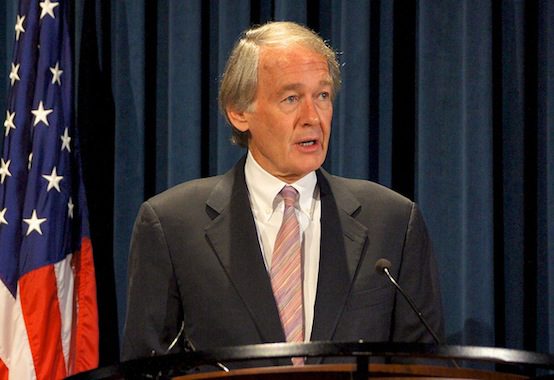Blue Republicans, Red Democrats

You wouldn’t expect the special election for Tim Scott’s vacant House seat in South Carolina to have much in common with the special election for John Kerry’s former Senate seat in Massachusetts. But despite the red/blue divide, there are some similarities that tell us important things about the state of national politics.
Democrats had seriously hoped to win a heavily Republican congressional district in South Carolina and invested significant resources in their attempt to do so. The GOP candidate, Mark Sanford, took an unexplained vacation from the state while governor in 2009. Turns out he was visiting his mistresses in Argentina.
Thus ended Sanford’s marriage and, so it seemed, his political career. He was essentially disavowed by his party’s congressional campaign committee this time around. But while the election results didn’t bear out the Democrats’ hopes, the early poll numbers were encouraging. Democrat Elizabeth Colbert Busch led Sanford by 9 percentage points at one point and was tied with him just days before the election.
Republicans entertain similar hopes in Massachusetts, where the Democratic nominee is Congressman Ed Markey. Markey was first elected to the House in 1976, but he has taken a powder from the state to live in Chevy Chase, Md. Though the congressman has for the last 13 years maintained his childhood home as his Massachusetts voting address, a similar residency issue helped unseat Indiana Republican Sen. Richard Lugar—also first elected in 1976—last year.
Bay State Republicans have visions of another Scott Brown dancing in their heads because of their candidate: Gabriel Gomez. Gomez is Latino, a former Navy SEAL, a successful businessman, and—in sharp contrast with Markey—not a career politician. He has staked out a mix of conservative and moderate-to-liberal positions that has served past Massachusetts GOP candidates well.
The polling has mostly shown a surprisingly close race, with Markey clinging to a single-digit lead. Only one of four recent statewide surveys shows the Democrat winning more than 50 percent of the vote. Public Policy Polling found Markey leading Gomez by just 44 percent to 40 percent.
Independents are now 53 percent of the Massachusetts electorate, and they have been trending Republican in the recent elections where the state party has actually been able to come up with a plausible candidate. But only Scott Brown in the 2010 special election carried them by a wide enough margin to overcome the Democratic base vote. Other Republicans—Sean Bielat against Barney Frank, Jeff Perry in a Cape Cod congressional race, Charlie Baker for governor in 2010, and Brown in last year’s reelection bid—were competitive but came up short.
The one poll that has Markey up by double digits contains warnings of why Gomez may join them. Suffolk/7News has a decent track record in the commonwealth and their polling finds state voters taking strong liberal positions on a whole host of issues. Barack Obama remains popular.
Gomez has tried to combat this by acclimating himself to Massachusetts’s unusual political climate. He has yet to come out foursquare for Obamacare repeal—an issue that helped Sanford return to Congress—though it’s clear his own plan would be different. By contrast, Colbert Busch is widely viewed as not doing enough to distance herself from her national party’s brand in South Carolina. (For good measure, Gomez says Sanford “seems pathetic,” as strong a shot as Colbert Busch ever took.)
Winning Massachusetts Republicans—Brown, William Weld, Paul Cellucci, and Mitt Romney make up the majority of the list—tend to run to the right on the issues they intend to focus on while running to the left on issues peripheral to their campaign. Pro-tax cuts, pro-choice. But that is a harder bet in a federal election than a gubernatorial race.
Brown had three things going for him that Gomez lacks—a Tea Party tidal wave that could be felt even in Massachusetts, a proven track record of turning out independents in tough races, and most importantly an element of surprise over a complacent state Democratic Party. We’ll see if Markey proves to be as bad a candidate as Martha Coakley.
But the main thing to look at beyond Boston or Charleston is this: neither party has an overwhelming advantage over the other, even if partisans on both sides are extremely confident. If these conditions hold into 2014—with the burgeoning IRS scandal, Benghazi, and the looming debt-ceiling fight just a few of the things that could possibly change them—the midterms may be decided by which party does a better job taking advantage of limited opportunities.
Democrats representing states or districts carried by Romney and Republicans representing places won by Obama are high on the list of targets. Senate retirements have created additional opportunities for Republicans, but in some cases top-tier candidates aren’t stepping forward.
That’s where the two parties’ limited forays into enemy territory will prove interesting. The lesson of South Carolina may well be that if Democrats can’t beat Sanford, they can’t win any reddish districts in this issue environment. But it could also be the case that if Colbert Busch had been willing to run as far to the right as, say, Heath Shuler, she’d be heading to Washington.
If Gomez beats Markey, he will become an example of how Republicans could potentially expand their map. If he doesn’t repeat Brown’s special election magic, the national GOP will probably avoid further blue-state incursions while the Massachusetts party turns its attention to the governor’s race—a contest Gomez could make even more interesting if he comes close next month.
W. James Antle III is editor of the Daily Caller News Foundation and author of the newly released Devouring Freedom: Can Big Government Ever Be Stopped?
Comments